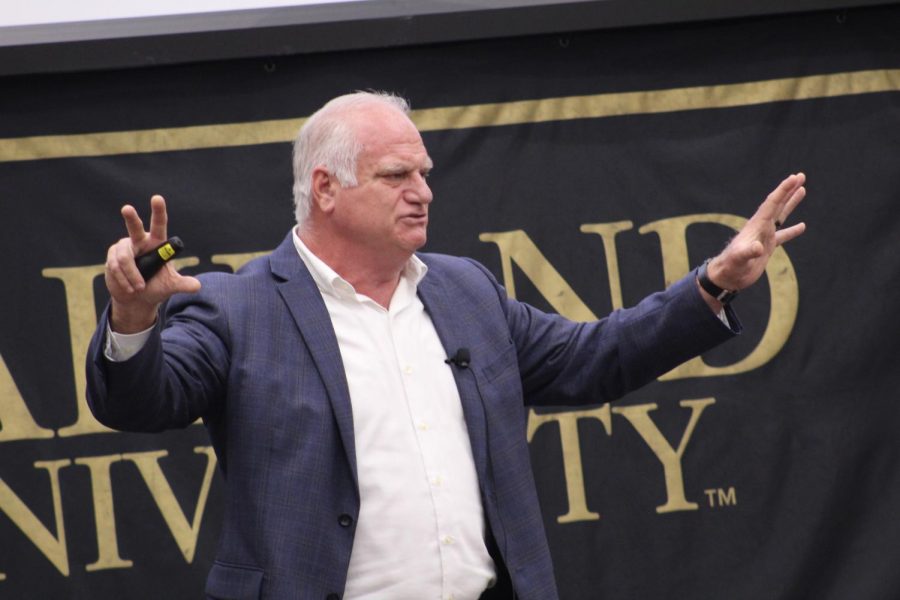Former Lions quarterback tackles Mental Health Awareness Forum
Former Detroit Lions quarterback Eric Hipple speaks about mental health in the Oakland Center on Tuesday, Oct. 8.
To continue Disability Awareness Month on campus, Oakland University hosted a Mental Health Awareness Forum, where Eric Hipple, former 10-season NFL quarterback for the Detroit Lions and professional motivational speaker, discussed mental health topics.
At the Tuesday, Oct. 8 forum, Hipple gave a keynote address about the stigmas surrounding mental health and suicide prevention. The Publisher Presidential Award-winning book “Real Men DO Cry” author’s views on mental health stemmed from his own battles with depression and suicide attempt after his NFL career ended.
Since his 15-year-old son’s death by suicide, Hipple has dedicated much of his life to destigmatizing and spreading awareness about mental illness. Hipple’s core mission is to solve problems and find appropriate treatments, such as turning trauma into triumph.
He said transitions can be especially difficult, as he experienced a large life shift after playing football from ages 9-32 and then losing part of himself when he no longer wore a uniform.
“When the time came — you’re cut, you’re no longer needed here, you can go out — loss of the uniform, loss of identity, loss of support system, loss of medical care, into a world I didn’t really know very much about because everything was kind of taken care of,” Hipple said. “I started struggling — Who am I? Is this all there is?”
In a time where signs of depression were dismissed because of negative connotations, Hipple was reluctant to get help. Now, he speaks to many about how to improve and maintain mental fitness through stress management and coping mechanisms, such as finding a sanctuary, physical relaxation techniques and establishing a support system.
Hipple stressed the keys to mental fitness (coined by Dr. Bryce Lefever): recognizing our choices, self-esteem, setting boundaries, vulnerability, communication, and commitment to mental fitness.
About suicide prevention, tendencies like feeling like a burden and intentional isolation can be discovered through awareness — thinking of how we observe others — and can be alleviated by helping people develop the appropriate coping mechanisms.
After Hipple’s keynote address, mental health professionals held the forum, where they answered questions about identifying struggling students, developing coping skills, normalizing mental illness, and talk therapy.
Forum members included Hipple, Dr. Robert Lacoste (psychiatrist and medical director of the Behavioral Health Unit for Ascension Providence Rochester Hospital), Stephanie Brandimarte (director of field and student support for the social work program), Christine Burk (Oakland Community Health Network director of communications and community outreach) and Penny Luebs (Oakland County Board of Commissioners and Easterseals employee).
With tackling issues like assumptions about mental illness, OU continues to increase its accessibility in other areas. According to Sarah Guadalupe, director of Disability Support Services, OU shines through services like the OU Counseling Center, providing mental health first aid training, offering support through Disability Support Services, and the new Grizzlies CARE Team for reporting behavior.
“OU has made the topic of mental health one of importance, and we will continue in these efforts,” she said. “We have developed a culture and mindset that strives to increase awareness for mental health topics and to provide advocacy and support.”






